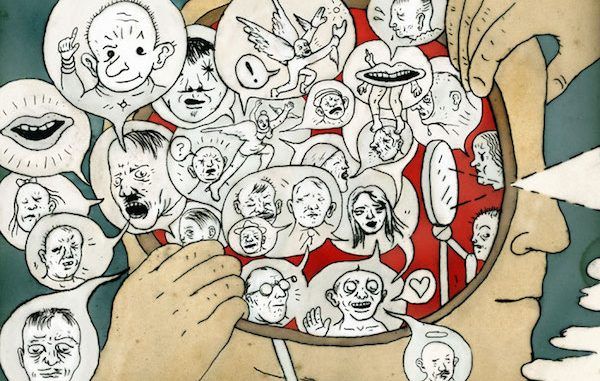
Research suggests that 1 in 25 people hear voices on a regular basis and 40% of the population will hear voices at some point in their lives. That means friends and family that you know are almost certainly going to hear voices in their heads.
But despite the social view that you are “mad” if you hear voices – most people that hear them live healthy and fulfilling lives.
The Independent reports:

BYPASS THE CENSORS
Sign up to get unfiltered news delivered straight to your inbox.
You can unsubscribe any time. By subscribing you agree to our Terms of Use
Recently, Waddingham and more than 200 other voice-hearers from around the world gathered in Thessaloniki, Greece, for the sixth annual World Hearing Voices Congress, organised by Intervoice, an international network of people who hear voices and their supporters. They reject the traditional idea that the voices are a symptom of mental illness. They recast voices as meaningful, albeit unusual, experiences, and believe that potential problems lie not in the voices themselves but in a person’s relationship with them.
“If people believe their voices are omnipotent and can harm and control them, then they are less likely to cope and more likely to end up as psychiatric patients,” says Eugenie Georgaca, a senior lecturer at the Aristotle University of Thessaloniki and the organiser of this year’s conference. “If they have explanations of voices that allow them to deal with them better, that is a first step toward learning to live with them.”
The road to this form of recovery often begins in small support groups run by the worldwide Hearing Voices Network (HVN). Founded in the Netherlands in 1987, it allows members to share their stories and coping mechanisms – for example, setting appointments to talk with the voices, so that the voice-hearer can function without distraction the rest of the day – and above all gives voice-hearers a sense of community, as people rather than patients.
A central premise of HVN is that these voices frequently emerge following extreme stress or trauma. Research bears that out: at least 70 per cent of voice-hearers are thought to have experienced some form of trauma. The characteristics of voices vary widely from person to person, but they often mimic the sound and language of abusers or their victims: demonic and frightening, or angelic and friendly.
Waddingham, for instance, now hears 13 voices. Among them are Blue, a frightened but cheeky three-year-old; Elfie, an angry adolescent; Tommy, a teenage boy who criticises her speech; the Scream, a female voice filled with pain and suffering (“When I first heard her, I felt so overwhelmed I was unable to leave the house”); and the Not Yets, a group of voices Waddingham is not yet ready to engage with fully. “They say very nasty things about me – abusive, sexual, violent things, which echo what I heard when I was little,” she says. “I try to think of them as frightened children that don’t yet know that it’s not OK to say those things.”
When the younger voices can’t fall asleep, Waddingham reads them bedtime stories. When voices suggest that she’s going to be harmed by a stranger, she thanks them for their concern but lets them know she is being vigilant.
Eleanor Longden tells a similar story. After leaving a psychiatric hospital with a diagnosis of schizophrenia at 18, she was assigned to work with a psychiatrist familiar with the hearing voices movement. He encouraged her to overcome her fear of her voices, which included both human and demonic-sounding ones.
Traditional psychiatry discourages patients from engaging with voices, and prefers to silence them through medication. But HVN members, like Longden, say that listening to voices is vital to calming them down. And by communicating back, Longden was able to test the boundaries of what these voices could actually do. One time, a voice threatened to kill her family if Longden didn’t cut off her toe, and she could hear a “phantom choir” laughing along with him. She refused to obey. Her family didn’t die, but the choir did go silent.
Read more: The enemy within: People who hear voices in their heads are being encouraged to talk back

